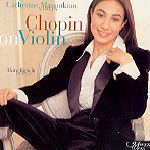Violinist Catherine Manoukian is now nearly 22 years old, but she was only 17 when she made this remarkable recording of Chopin transcriptions. Have you heard this yet? If you haven’t, and you enjoy robust, mellifluous, artfully executed violin playing, then you certainly should. In 1994, Toronto-born Manoukian won the grand prize at the Canadian Music Competition, and since then she’s performed with major orchestras and conductors, appeared at several of the big music festivals, and made a handful of well-received recordings. But on evidence of her commanding rendition of the disc’s opening work–Behzad Ranjbaran’s transcription of Chopin’s Cello Sonata Op. 65–she deserves considerably more than the respectable attention she’s so far attained. In the big opening movement of the sonata, she not only plays the notes with impressive accuracy and brilliant tone, but her authoritative bowing and well-organized phrasing show a maturity that bodes well for such a young artist.
As we’ve come to expect from today’s emerging soloists (she is among the legion of Dorothy Delay students), the technique is absolutely solid, showing no sign of weakness or timidity, and especially in the faster pieces–the scherzo and allegros of the Sonata, the moto perpetuo of the Op. 10 Etude that concludes the program–she projects nothing but confidence and fearlessness. She effortlessly and with perfect intonation conquers the various chromatic runs and extreme heights of the E-string (in the Op. 69 No. 2 waltz and Op. 9 No. 2 nocturne, for example), and her multitudinous double-stop passages are played with rich tone and assured style. And speaking of tone, Manoukian’s bow draws one of the plushest G-string sounds you’ll ever hear–one of those un-teachable expressive gifts, but also a function of her gorgeous 1861 Vuillaume violin (once owned by Ysaÿe)–and produces shiver-inducing upper-register notes.
It’s only in the slower music–the Largo of the sonata, the Op. 72 Nocturne–that we sense a slightly underdeveloped interpretive view, and we might wish for a little more rubato here, a bit more subtlety there, a playful flip, a more lingering diminuendo. But overall, this wonderful violinist has perfectly captured the excitement and drama inherent in these transcriptions–by such luminaries as Sarasate, Kreisler, Milstein, Auer, and Saint-Saëns, not to mention contemporary composer/Juilliard professor Ranjbaran–and most importantly celebrates their exceptional, irresistible melodic beauty. And what a stylish, dynamic pianist is Akira Eguchi! Here is another young artist who commands attention by virtue of his mature musicianship and dashing technique. The sound is ideally balanced, slightly on the bright side, and true to the natural sound of the instruments. My next task is to find Manoukian’s debut recording, Elegies & Rhapsodies, also available from Marquis. [3/29/2003]
































